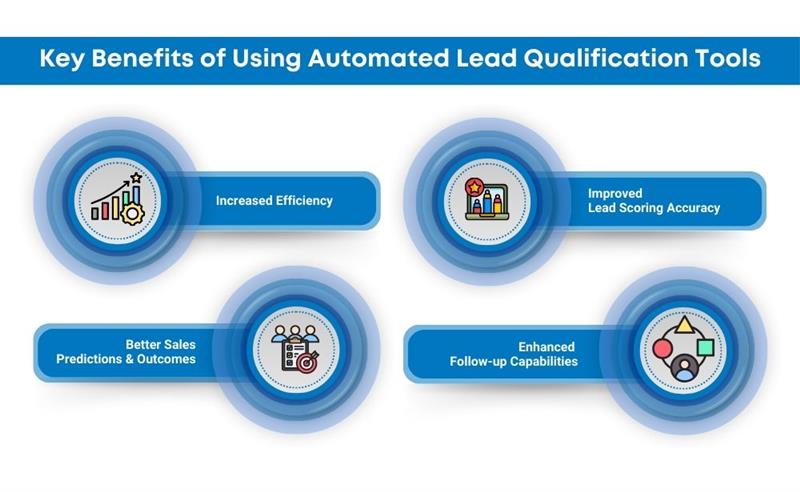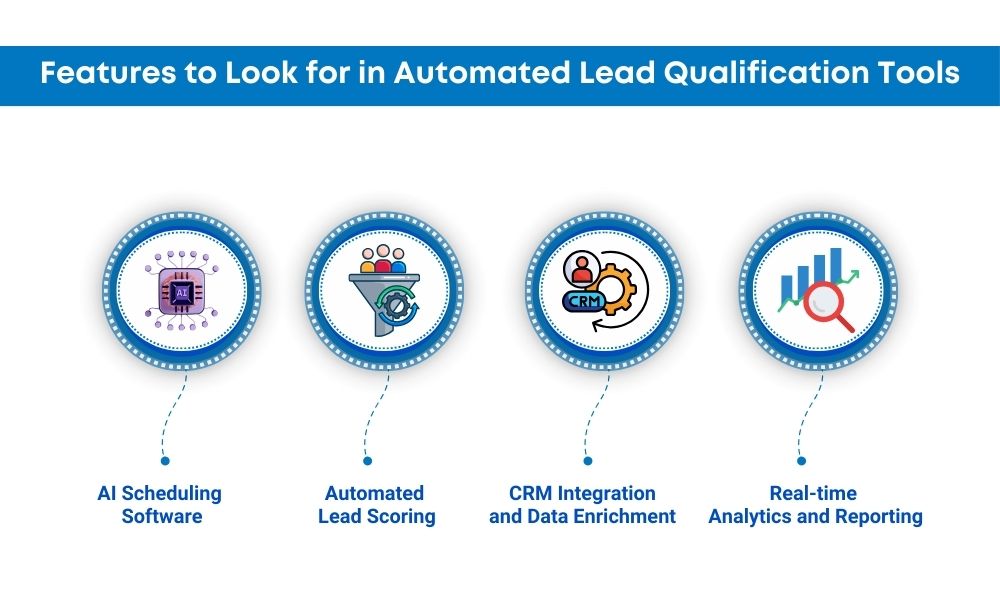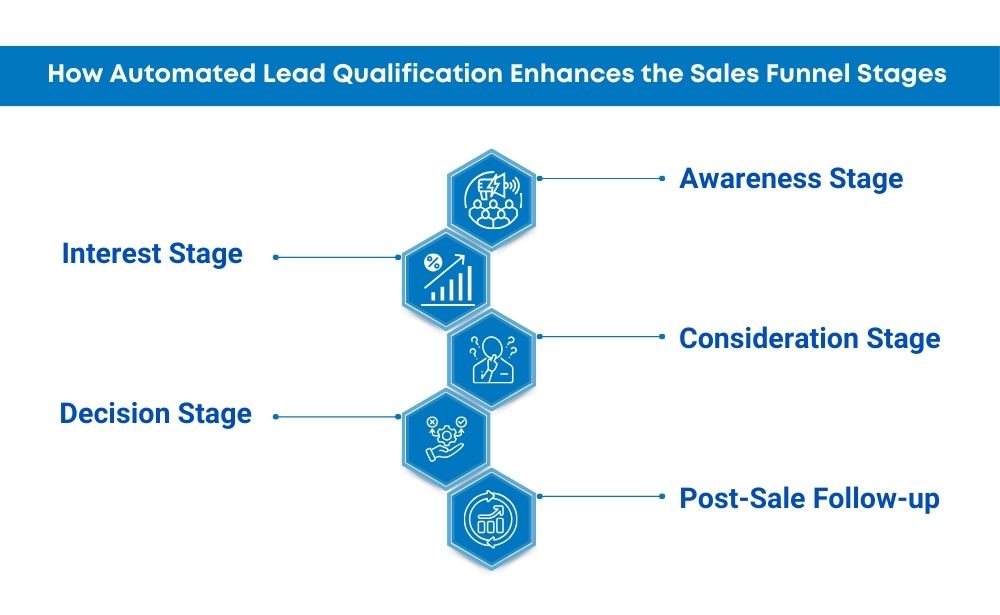As the world of B2B sales shifts to become increasingly data-driven, the demand for automated lead qualification tools has soared. These AI-powered tools save time, increase sales efficiency, and allow sales teams to focus on prospects with the highest potential. According to recent data, companies leveraging AI for lead qualification see a 30% increase in sales productivity and a 20% reduction in the sales cycle duration. Let’s explore how automated lead qualification tools can make a real difference for your sales team, enhance customer engagement, and ultimately drive revenue growth.
What is Automated Lead Qualification?
In simple terms, automated lead qualification is the use of AI and machine learning to assess, score, and segment leads. Instead of manually sorting through leads and assigning them based on basic criteria, AI algorithms can analyze behavioral data, engagement history, and even demographic information. By doing so, they identify and rank leads, enabling your sales team to target those most likely to convert.
For instance, platforms with AI scheduling software can automatically assign sales reps to qualified leads, optimizing response times and ensuring no high-potential lead falls through the cracks. This is especially valuable in B2B sales, where timing and precision are crucial. AI also enables sales lead automation by scoring leads, enriching CRM data, and providing predictive analytics, making the qualification process faster and more accurate than ever.
Key Benefits of Using Automated Lead Qualification Tools
Using AI-powered lead qualification tools offers several advantages for modern sales teams. Here’s a closer look at why they’re becoming indispensable:
- Increased Efficiency
By automating routine tasks like lead sorting and prioritization, these tools free up sales reps to focus on high-impact activities. A recent study found that automated lead qualification tools can reduce manual lead processing by up to 50%, giving sales teams more time to focus on actual selling.
- Improved Lead Scoring Accuracy
AI tools use data-driven insights to accurately score leads based on historical behavior and likelihood to convert. This ensures sales teams engage only with leads that meet ideal customer criteria. Sales lead automation has shown to improve lead-to-opportunity conversion rates by as much as 25%.
- Better Sales Predictions and Outcomes
AI systems can predict customer behavior by analyzing patterns, enabling businesses to better forecast revenue and pipeline growth. The results? A smoother sales cycle and better preparation for closing deals. Companies using these tools often report up to a 40% improvement in sales forecast accuracy.
- Enhanced Follow-up Capabilities
With AI, follow-ups are automated based on engagement level, ensuring timely responses and reducing lead abandonment. AI B2B sales tools can also be integrated with email and CRM platforms to provide real-time engagement insights, making it easier for teams to act promptly.

Features to Look for in Automated Lead Qualification Tools
To maximize the potential of AI in sales, it’s essential to choose tools with robust features tailored to your needs. Here are some must-haves:
- AI Scheduling Software: This feature lets you schedule meetings automatically, aligning calendars and sending reminders to both prospects and sales reps, which improves conversion rates by reducing no-shows.
- Automated Lead Scoring: Look for tools that offer advanced lead scoring algorithms based on behavior, engagement, and purchase intent. Automated lead scoring increases the accuracy and relevance of your sales team’s engagement.
- CRM Integration and Data Enrichment: AI-powered lead qualification tools should seamlessly integrate with your CRM, allowing you to enrich data with external insights. This integration gives sales teams a clearer understanding of the buyer persona and preferences.
- Real-time Analytics and Reporting: Effective tools should offer data-driven insights into lead quality and provide detailed reports on conversion rates, engagement metrics, and ROI. This helps your team make informed decisions and constantly improve sales strategy.

How Automated Lead Qualification Enhances the Sales Funnel Stages
AI-driven lead qualification tools offer targeted assistance at each stage of the sales funnel:
- Awareness Stage: At this stage, AI tools track leads’ digital behavior and interest levels, guiding them toward relevant content or products. Automated lead nurturing can increase engagement by up to 50%.
- Interest Stage: AI tools segment leads based on factors like content engagement and website activity, allowing your sales team to deliver personalized messaging that aligns with their interests.
- Consideration Stage: Automated lead qualification assigns scores based on readiness, helping sales teams prioritize high-potential leads. This stage is where AI B2B sales tools shine, enhancing decision-making with data-rich insights.
- Decision Stage: AI-driven tools identify high-intent leads, so your sales reps focus on closing deals with the most promising prospects. Companies using AI report a 20% faster close rate in this stage.
- Post-Sale Follow-up: These tools can automate follow-ups or even cross-sell recommendations, ensuring a smooth transition from closing the sale to nurturing long-term relationships.

Implementing Sales Lead Automation: Steps for Success
Getting started with sales lead automation requires careful planning. Here’s a step-by-step guide to implementing it effectively:
- Step 1: Assess your current lead qualification process to identify any bottlenecks or inefficiencies.
- Step 2: Choose the right AI-powered tools that align with your business objectives and sales goals.
- Step 3: Train your sales team on how to use these tools effectively. Many vendors offer training sessions to help your team get the most from their investment.
- Step 4: Monitor and refine the process by tracking KPIs such as lead conversion rates, follow-up response times, and overall sales pipeline health. This enables you to identify what’s working and areas for improvement.
How AI B2B Sales Tools Transformed a Sales Team’s Efficiency
Consider a mid-sized B2B company that implemented an AI scheduling software to manage lead follow-ups and prioritize high-intent prospects. After using the software for six months, they reported a 35% improvement in lead conversion rates, a 20% reduction in sales cycle duration, and a 15% boost in overall revenue. The takeaway? By automating time-consuming tasks and focusing on high-quality leads, companies can significantly improve sales efficiency and outcomes.
Challenges and Considerations in Using Automated Lead Qualification Tools
Despite the many benefits, there are some challenges to consider:
- Data Privacy and Compliance: With regulations like GDPR, it’s essential to ensure that data collection and processing comply with relevant laws. Reliable tools will have built-in compliance features to protect customer data.
- Balancing Automation with Human Touch: While automation is powerful, maintaining a personal connection with leads is essential. AI can identify high-potential leads, but sales reps should personalize their outreach to close deals effectively.
- Cost vs. Benefit Analysis: Evaluate the potential ROI to ensure the tools justify the cost. Start small with key features, and scale up as you see positive results.
Conclusion
AI-powered tools for automated lead qualification are transforming sales by enabling teams to work smarter, not harder. By integrating sales lead automation and AI scheduling software into your workflow, your team can focus on what they do best: building relationships and closing deals. Automated lead qualification not only saves time but also empowers sales reps to engage leads with greater precision.
Ready to maximize your sales efficiency with AI? Reach out to us to learn how automated lead qualification tools can drive your sales success and help your business grow.

